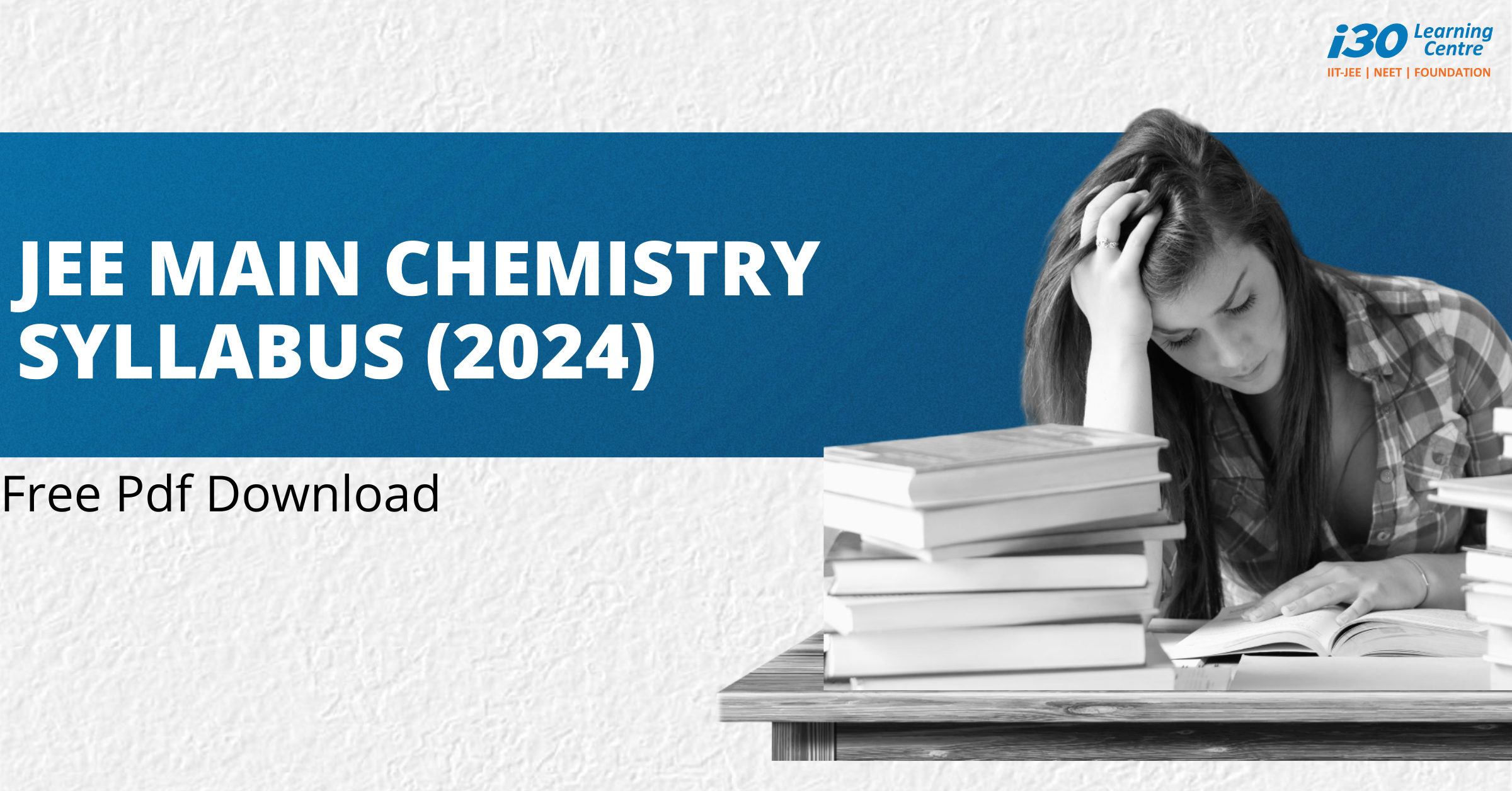Welcome to our comprehensive guide on the JEE Chemistry Main Syllabus for the year 2024. If you’re a JEE aspirant looking to excel in the Chemistry section of the upcoming JEE Main exam, you’ve come to the right place. In this blog we will provide you the most valuable and up-to-date information to help you succeed in your JEE journey.
Understanding the JEE Main Chemistry Syllabus
To achieve success in the JEE Main exam, it is essential to have a clear understanding of the Chemistry syllabus. The JEE Main Chemistry syllabus for 2024 covers a wide range of topics, including:
1. Physical Chemistry
Physical Chemistry focuses on the fundamental principles and concepts of chemistry. It includes topics like:
- Atomic Structure
- Chemical Bonding and Molecular Structure
- States of Matter: Gases, Liquids, and Solids
- Thermodynamics
- Equilibrium
- Redox Reactions
- Electrochemistry
- Chemical Kinetics
2. Organic Chemistry
Organic Chemistry deals with the study of carbon-containing compounds. Key topics in Organic Chemistry are:
- Basic Concepts of Organic Chemistry
- Hydrocarbons
- Haloalkanes and Haloarenes
- Alcohols, Phenols, and Ethers
- Aldehydes and Ketones
- Carboxylic Acids and their Derivatives
- Amines
- Biomolecules
- Polymers
- Chemistry in Everyday Life
3. Inorganic Chemistry
Inorganic Chemistry focuses on the study of inorganic compounds and materials. The major topics in Inorganic Chemistry include:
- Classification of Elements and Periodicity in Properties
- General Principles and Processes of Isolation of Metals
- Hydrogen
- S-Block Elements (Alkali and Alkaline Earth Metals)
- P-Block Elements
- D- and F-Block Elements
- Coordination Compounds
- Environmental Chemistry
- Detailed Breakdown of the Syllabus
Physical Chemistry
Atomic Structure:
This section delves into the fundamental particles that make up an atom, the various atomic models, electronic configurations, and the periodic properties of elements.
Chemical Bonding and Molecular Structure:
Here, we explore the different types of chemical bonds, molecular geometry, VSEPR theory, and hybridization.
States of Matter:
In this segment, we study the properties and behavior of gases, liquids, and solids, along with the factors affecting their physical states.
Thermodynamics:
Thermodynamics deals with energy changes during chemical reactions, enthalpy, entropy, and spontaneity.
Equilibrium:
This topic covers reversible reactions, Le Chatelier’s principle, equilibrium constant, and factors influencing chemical equilibrium.
Redox Reactions:
We discuss oxidation and reduction reactions, balancing redox equations, and electrochemical cells.
Electrochemistry:
This section focuses on electrochemical cells, electrolysis, and conductance.
Chemical Kinetics:
Here, we study the rate of chemical reactions, the rate constant, and various factors affecting reaction rates.
Organic Chemistry
Basic Concepts of Organic Chemistry: This introductory section covers the unique features of carbon compounds and the nomenclature of organic compounds.
Hydrocarbons:
We delve into the classification and properties of hydrocarbons, including alkanes, alkenes, alkynes, and aromatic hydrocarbons.
Haloalkanes and Haloarenes:
This segment focuses on halogen-containing organic compounds and their properties.
Alcohols, Phenols, and Ethers:
Here, we explore the structure, properties, and reactions of alcohols, phenols, and ethers.
Aldehydes and Ketones:
This section deals with the properties, preparation, and reactions of aldehydes and ketones.
Carboxylic Acids and their Derivatives:
We study carboxylic acids, acid derivatives, and their reactions.
Amines:
This topic covers the classification, structure, and reactions of amines.
Biomolecules:
Biomolecules include carbohydrates, proteins, lipids, and nucleic acids, and we delve into their structures and functions.
Polymers:
In this segment, we discuss the various types of polymers and their properties.
Chemistry in Everyday Life: Finally, we explore the applications of chemistry in our daily lives, including pharmaceuticals and household products.
Inorganic Chemistry
Classification of Elements and Periodicity in Properties: This introductory section covers the periodic table, periodic trends, and properties of elements.
General Principles and Processes of Isolation of Metals:
We explore the extraction of metals from ores and their purification.
Hydrogen:
This section delves into the properties and uses of hydrogen.
S-Block Elements (Alkali and Alkaline Earth Metals):
Here, we study the properties and reactions of the s-block elements.
P-Block Elements:
This segment focuses on the properties and reactions of the p-block elements.
D- and F-Block Elements:
We discuss the transition metals and inner transition metals, along with their properties.
Coordination Compounds:
This topic covers coordination complexes and their applications.
Environmental Chemistry:
Finally, we explore environmental issues related to chemistry, including pollution and climate change.
Download JEE Main Chemistry 2024 Syllabus PDF
To excel in the JEE Main Chemistry section, it’s crucial to have a clear understanding of the updated syllabus. You can now Download JEE Main Chemistry 2024 syllabus PDF for free. This comprehensive PDF includes all the topics, sub-topics assigned to each unit, helping you plan your preparation effectively.
Conclusion
In conclusion, a thorough understanding of the JEE Main Chemistry Syllabus (2024) is crucial for scoring well in the JEE Main exam. By mastering the various topics in Physical, Organic, and Inorganic Chemistry, you can enhance your chances of excelling in this section of the exam.


